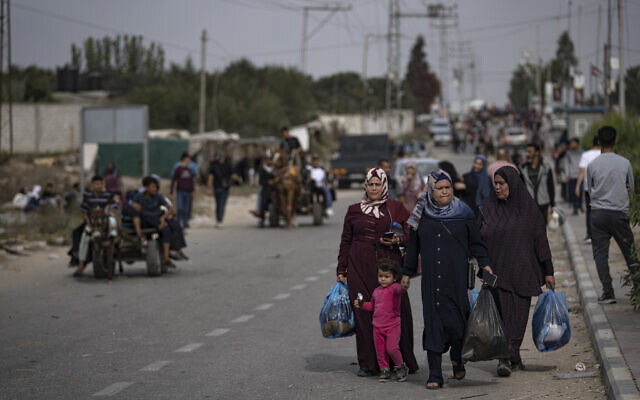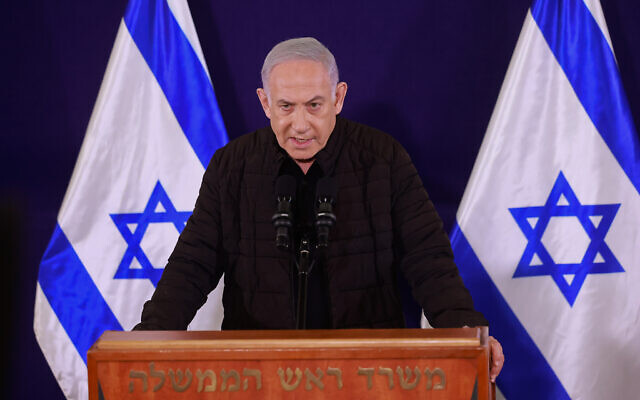PM warns ministers to pipe down after comments on new ‘Nakba’ and nuking Gaza
Netanyahu cautions cabinet, ‘if you don’t know – don’t speak,’ as members’ comments seen to harm Israel’s international legitimacy
Prime Minister Benjamin Netanyahu warned cabinet ministers Sunday to choose their words with care regarding Israel’s war with the Hamas terror group.
“Every word has meaning when it comes to diplomacy. If you don’t know — don’t speak,” the prime minister said during Sunday’s cabinet meeting.
“We must be sensitive,” he added.
The prime minister was referring to recent comments by ministers that are viewed as having caused damage to Israel’s international legitimacy.
Agriculture Minister Avi Dichter told Channel 12 on Saturday that the war was “Gaza’s Nakba” — the Arabic word for “catastrophe” that many Arabs used to describe the displacement of Palestinians amid the 1948 War of Independence.
The term has been widely used by Arab commentators to describe the devastation of the war, but its use by an Israeli minister gives fuel to claims that Israel is attempting to drive the Palestinian civilian population out of Gaza. Jerusalem insists it has no such plans.
When asked if Gaza residents would be able to return to their homes after the war, Dichter, a former Shin Bet chief, said, “I don’t know how it will end. You have to remember that Gaza City takes up about a third of the Strip. Half of the population but one-third of the Strip.”
Heritage Minister Amichai Eliyahu made waves in international media last week when he suggested one of Israel’s options in the war against Hamas could be to drop a nuclear bomb on Gaza, in comments that Netanyahu quickly disavowed, before suspending him from cabinet meetings.
Eliyahu, a member of National Security Minister Itamar Ben Gvir’s far-right Otzma Yehudit party, was speaking in an answer to a question in a radio interview.
“Your expectation is that tomorrow morning we’d drop what amounts to some kind of nuclear bomb on all of Gaza, flattening them, eliminating everybody there…” the interviewer for Radio Kol Berama said.
“That’s one way,” Eliyahu responded. “The second way is to work out what’s important to them, what scares them, what deters them.”
Meanwhile, several ministers have stated that Israel could or should consider rebuilding settlements in the Strip, again contradicting Israel’s official position that it has no intention to reoccupy Gaza for the long term.

Israel has faced mounting international pressure over its military campaign as the reported death toll from Gaza has risen, with commentators expecting that calls for a ceasefire will only intensify as the weeks go by and the civilian costs rise. Israel declared war on Hamas after some 3,000 terrorists burst through the border from Gaza and slaughtered 1,200 people, most of them civilians, and abducted some 240, on October 7.
Jerusalem views global support — and US support in particular — as crucial for its effort to dismantle Hamas in the Strip, and has increasingly allowed humanitarian aid and civilian travel corridors amid the fighting.
On Saturday, IDF Spokesman Rear Adm. Daniel Hagari said ground forces, with air and naval support, were “deepening” operations in Gaza City. He said Hamas was losing control of northern Gaza, as civilians evacuate the area “against the instructions” of the terror group, and noted that some 200,000 had left the Strip’s north in the past three days.
Emanuel Fabian contributed to this report.

No comments:
Post a Comment